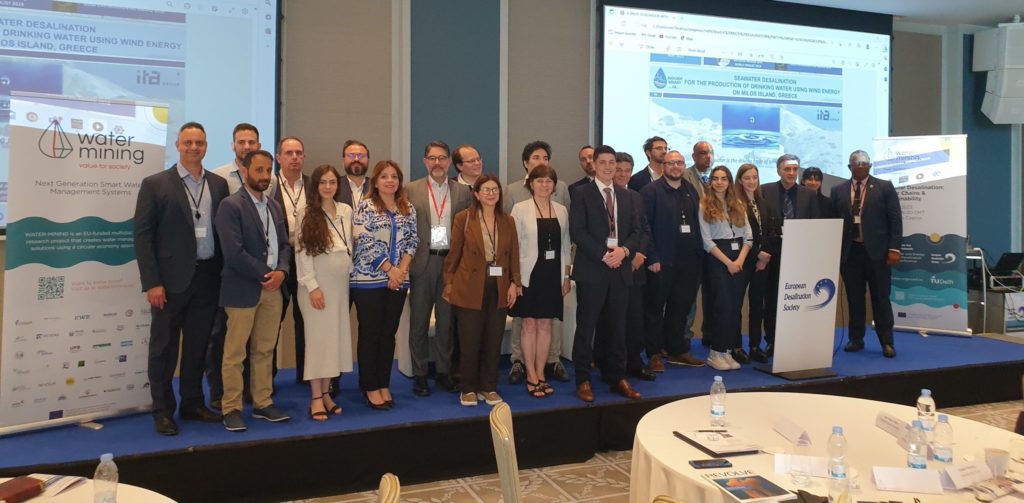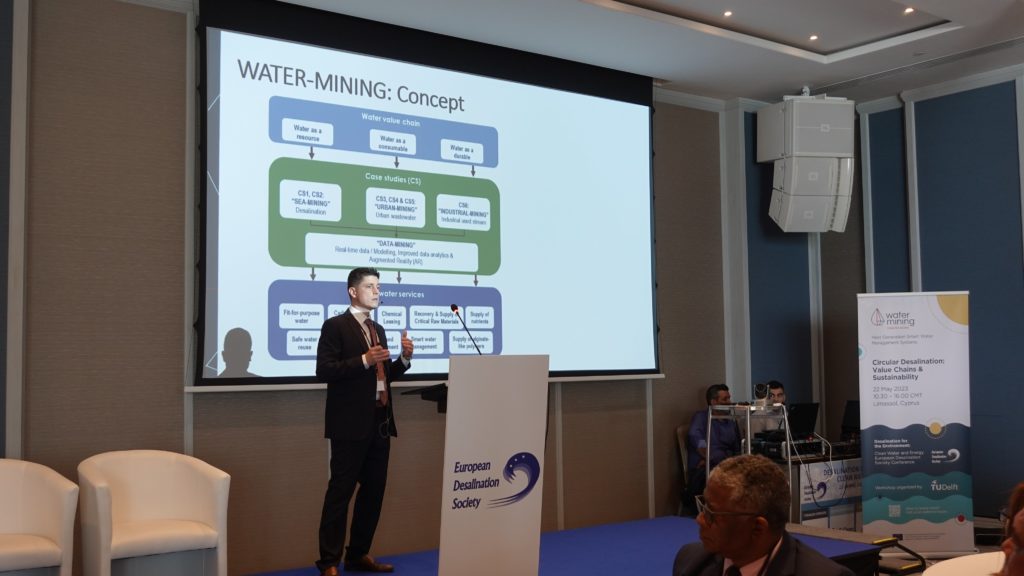Recovering valuable resources from desalination processes is possible while providing freshwater to meet growing demand.

Desalination for the Environment, Clean Water and Energy Congress, Limassol – Cyprus. Photo: Stuart Reigeluth
22 May 2023 – Limassol, Cyprus
Within the framework of the European Desalination Congress, “Desalination for the Environment, Clean Water and Energy”, taking place this week (23-26 May) in Limassol, the WATER-MINING project curated a special workshop about “Circular Desalination: Value Chains & Sustainability” at the Parklane Hotel.
As the most water scarce country in Europe and with an 80% dependency on desalination technologies for providing freshwater, Cyprus also symbolizes the quest for greater energy independence from traditional fossil fuels that continue to power desalination plants in Cyprus.
With a population of close to half a billion people, the Mediterranean region is the most water scarce in the world and the Mediterranean has the highest temperature rises due to climate change, so the need for sustainable solutions could not be more pressing for society at large.
Opening the WATER-MINING workshop to address water as one of our most valuable resources, the organizer Dimitris Xevgenos, Assistant Professor at the Technology, Policy and Management Faculty of TU Delft, reasserted that: “Society is a key focal point” in connecting the economy and environment.

Dimitris Xevgenos, Workshop on “Circular Desalination: Value Chains & Sustainability”, Cyprus. Photo: Stuart Reigeluth
“WATER-MINING is investing resources to involve end-users in fine-tuning circular water solutions including brine recovery management for commercialization,” said Arnoldas Milukas, Head of Unit for Biodiversity, circular economy and environment at the European Research Executive Agency.
A cluster of five water-related EU-funded projects called CIRSEAU is dedicated to long-term impact for society, environment and economy, in order to address water scarcity with water-smart solutions based on sustainable circular economy models.
WATER-MINING project is looking at three aspects of water:
1) Water as a resource, called ‘Sea-mining’ with desalination solution;
2) Water as a consumable, called ‘Urban-Mining’ addressing wastewater; and
3) Water as a durable, ‘Industrial mining’, each with pilot case studies ongoing around Europe.
WATER-MINING | Desalination for the Environment, Clean Water and Energy
Highlights from the workshop included overview presentations for the many European funding mechanisms that often have important synergies and strategic overlap, particularly where water and energy issues coincide such as with desalination solutions and pilot projects at different scales that can implement those solutions.
Guillermo Zaragoza from WATER-MINING Partner CIEMAT – the largest solar power research center in Europe – showed the dropping prices of renewable energies, in particular solar power of course, but also the value of thermal storage to provide greater decentralization and independence to desalination plants and by extension to making ‘energy islands’ a reality. Most Mediterranean islands have a shortage of water in the summer season but also a surplus of energy from the sun, so squaring this circle is where this workshop came into play: providing circular economy solutions for greater efficiency.
The importance of extracting valuable minerals, even rare earths, from brine was mentioned as a means to become less dependent on China for rare earths on a more global level. Enhancing Europe’s global economic competition as well, green hydrogen produced from renewable energy is a very attractive solution but is still in the early phases of development.
In a nutshell, desalination plants provide pure water that can be used for electrolysis to make hydrogen and green hydrogen could be used as the energy carrier to power the electrolysis process, coming full circle. The tradeoff will be how to use the potable water for the growing demand of human populations and the incremental agricultural needs versus using the water for the energy sector, including green hydrogen production.
Close to 200 million people in the Mediterranean region are already affected by water stress, and this number will increase due to population growth, incremental urbanization, and ongoing climate change. The demand for water in the Mediterranean is expected to increase by 50% by 2050, while the available water resources are expected to decrease by 10-30%.
With these socioeconomic-environmental Malthusian trap figures in mind, whereby demand outstrips supply by far, the need for solutions urgently now is paramount and will be addressed this week (23-26 May 2023) at the European Desalination Society Congress.